Eduardo Goulart de Andrade
Eduardo Goulart is brazil editor at the Organized Crime and Corruption Reporting Project (OCCRP), an international consortium of investigative journalism. He also works as curator of the Pinpoint project, Abraji’s partnership with Google. He is the creator of the Eye on The Data newsletter, in which he shares tips, techniques and tools for digital research. […]
Eduardo Goulart is brazil editor at the Organized Crime and Corruption Reporting Project (OCCRP), an international consortium of investigative journalism. He also works as curator of the Pinpoint project, Abraji’s partnership with Google. He is the creator of the Eye on The Data newsletter, in which he shares tips, techniques and tools for digital research. As a freelance reporter, he investigated corruption and environmental destruction, revealing mining on indigenous lands, illegal timber exports and fraud in pandemic contracts. His work can be read in vehicles such as The Intercept Brasil, Vice Brasil, Deutsche Welle Brasil, Mongabay, InfoAmazonia, Chequeado, UOL and Metrópoles. He was editor of the Newsletters Investigadora, abraji, and Don’t LAI to me, of the agency Know. He also worked as a reporter at TV Brasil and was an instructor at Abraji, teaching Open Source Intelligence (OSINT) techniques to Brazilian journalists and students. At the Data Privacy Brasil Research Association, he was a researcher and editorial coordinator of the “Viral Data” project.
Veja também
-
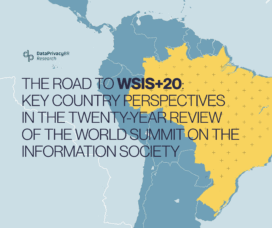
The Road to WSIS+20: Key Country Perspectives in the Twenty-Year Review of the World Summit on the Information Society
This report aims to support engagement in the WSIS+20 process by providing insight into the positions and priorities of selected governments.
-
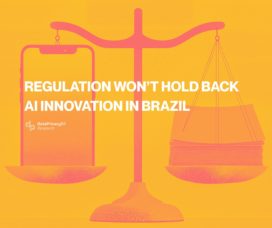
Regulation Won’t Hold Back AI Innovation in Brazil
The Brazilian Chamber of Deputies has until the end of the year to deliver a final report that could shape the future of Brazilian law. Legal regulation, however, cannot be the only republican response to the explosion in the use of AI systems. Learn more about Data Privacy Brasil’s position in the article below.
-
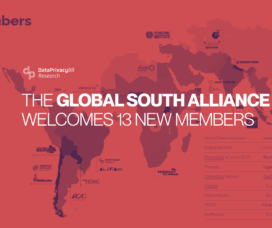
The Global South Alliance welcomes 13 new members
The Global South Alliance is a coalition formed in 2022 with the mission of unifying NGOs dedicated to the promotion of mutual learning and the advancement of digital rights with a perspective from the Global South. In May, the Global South Alliance welcomed 13 new members, reaching the total number of 26 organisations.
-

AI Explainability: How to Avoid Rubber-Stamping Recommendations
Experts debate if human oversight can replace the need for the explainability of AI systems. Bruno Bioni, co-director of Data Privacy Brasil, was one of the experts interviewed. Check it out in the text!
-

Job Opening: Digital Librarian
The Data Privacy Brasil makes the notice public with registrations until July 11th.
-
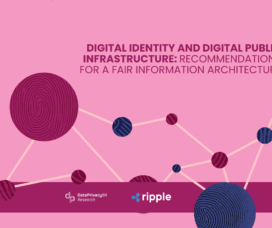
Report | Digital Identity and Digital Public Infrastructure: recommendations for a fair information architecture
Data Privacy Brasil launches its new report entitled “Digital Identity and Digital Public Infrastructure: recommendations for a fair information architecture”. The study examines the impact of a Digital Public Infrastructure (DPI), especially digital identity applications, on the protection of personal data in light of the Brazilian Federal Constitution (CF) and the General Data Protection Law (LGPD).
-

Five-Point Plan for an Inclusive WSIS+20 Review
As stakeholders engaged in the WSIS+20 Review process, organizations sign the petition presenting recommendations to help operationalize the WSIS+20 review modalities in order to ensure transparency, inclusion, and meaningful stakeholder engagement.
-
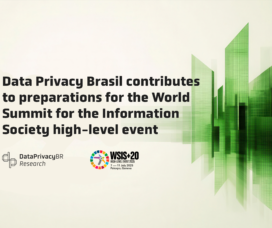
Data Privacy Brasil contributes to preparations for the World Summit for the Information Society high-level event
The event, which is co-organized by the ITU, UNESCO, UNDP, and UNCTAD, takes place in July, and this March, stakeholders were able to send their suggestions regarding the format and content to be debated, especially in light of the review process.
Veja Também
-

The Road to WSIS+20: Key Country Perspectives in the Twenty-Year Review of the World Summit on the Information Society
This report aims to support engagement in the WSIS+20 process by providing insight into the positions and priorities of selected governments.
-

The Global South Alliance welcomes 13 new members
The Global South Alliance is a coalition formed in 2022 with the mission of unifying NGOs dedicated to the promotion of mutual learning and the advancement of digital rights with a perspective from the Global South. In May, the Global South Alliance welcomed 13 new members, reaching the total number of 26 organisations.
-

AI Explainability: How to Avoid Rubber-Stamping Recommendations
Experts debate if human oversight can replace the need for the explainability of AI systems. Bruno Bioni, co-director of Data Privacy Brasil, was one of the experts interviewed. Check it out in the text!
-

Job Opening: Digital Librarian
The Data Privacy Brasil makes the notice public with registrations until July 11th.
-

Report | Digital Identity and Digital Public Infrastructure: recommendations for a fair information architecture
Data Privacy Brasil launches its new report entitled “Digital Identity and Digital Public Infrastructure: recommendations for a fair information architecture”. The study examines the impact of a Digital Public Infrastructure (DPI), especially digital identity applications, on the protection of personal data in light of the Brazilian Federal Constitution (CF) and the General Data Protection Law (LGPD).
-

Five-Point Plan for an Inclusive WSIS+20 Review
As stakeholders engaged in the WSIS+20 Review process, organizations sign the petition presenting recommendations to help operationalize the WSIS+20 review modalities in order to ensure transparency, inclusion, and meaningful stakeholder engagement.
-

Data Privacy Brasil contributes to preparations for the World Summit for the Information Society high-level event
The event, which is co-organized by the ITU, UNESCO, UNDP, and UNCTAD, takes place in July, and this March, stakeholders were able to send their suggestions regarding the format and content to be debated, especially in light of the review process.
-
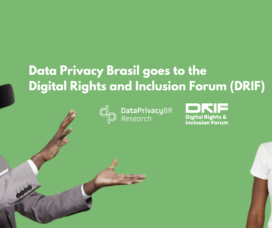
Data Privacy Brasil goes to the Digital Rights and Inclusion Forum (DRIF)
For the third consecutive year, Data Privacy Brasil will participate in the Digital Rights and Inclusion Forum (DRIF). DRIF – formerly known as the Internet Freedom Forum (IFF) – is an annual forum organized by Paradigm Initiative (PIN), since 2013, to be a space for discussions on global issues related to digital rights and inclusion.
-

Digital Merger Watch: Data Privacy Brasil joins new global initiative
The group includes national and international organizations and will focus on analyzing and challenging Big Tech’s efforts to reinforce its dominance through mergers and acquisitions.
-
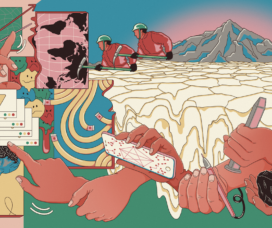
Beyond Digital Rights: Towards a Fair Information Ecosystem?
One of the major challenges in the field of digital rights is the tendency toward segmentation and hyper-specialization in topics such as privacy, freedom of expression, net neutrality, data protection, and the regulation of AI systems. Learn more about the topic in the article published in Tech Policy.
-
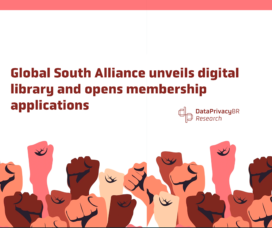
Global South Alliance unveils digital library and opens membership applications
The GSA invites organizations to express their interest in joining the network by completing the application form available until April 24.
-
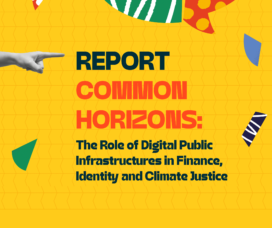
Common Horizons: The Role of Digital Public Infrastructure in Finance, Identity and Climate Justice
In 2024, Data Privacy Brasil held the event “Common Horizons: The Role of Digital Public Infrastructure in Finance, Identity and Climate Justice". To continue the discussions held during the event, Data launched a new report with the aim of reflecting the lessons learned during the tracks promoted at the meeting.
-
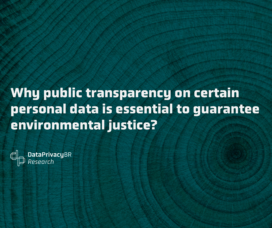
Why public transparency on certain personal data is essential to guarantee environmental justice?
Between 2022 and 2023, Data Privacy Brasil developed the project Environment and Information: contesting the political instrumentalization of LGPD in Environmental Regulation which focuses on the intersection of digital rights and environmental policies.
-
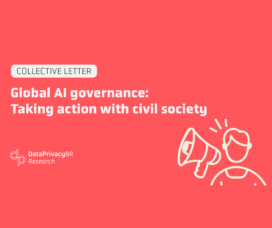
Global AI governance: Taking action with civil society
More than 40 civil society organizations call for inclusion in AI Action Summit in letter on global governance of Artificial Intelligence.
-
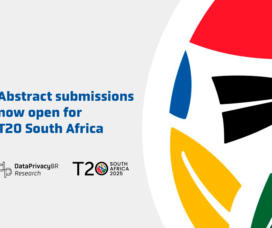
Abstract submissions now open for T20 South Africa
The Think20 South Africa invites researchers from around the world to contribute to a dynamic exchange of ideas on today's most pertinent challenges. The deadline for submitting abstracts is February 10, 2025.
-
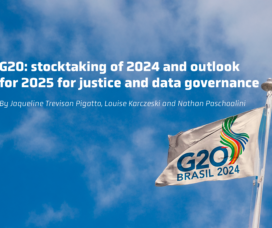
G20: stocktaking of 2024 and outlook for 2025 for justice and data governance
In 2024, Data Privacy Brasil took on a new and exciting challenge: participating in the G20 ecosystem, during the Brazilian presidency, through the official engagement group for think tanks, Think 20 (T20). Check out the text to learn more about Data's work at the G20.
-
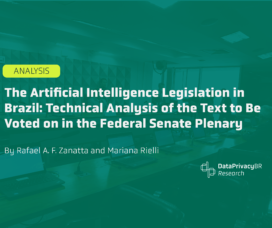
The Artificial Intelligence Legislation in Brazil: Technical Analysis of the Text to Be Voted on in the Federal Senate Plenary
The Internal Temporary Artificial Intelligence Committee (CTIA) of the Federal Senate approved the substitute report for Bill 2338/2023. This bill aims to define the legal framework for regulating the use of Artificial Intelligence systems in Brazil.
-

DIRECT Learning Series: Advocating for Independent Regulators
The 6th workshop took place on November 6th, 2024, in the context of the Data Rights and Enforcement through Community Trust (DIRECT) Learning Series, an ongoing thematic series of workshops with members of the DIRECT consortium, supported by Internews.
-
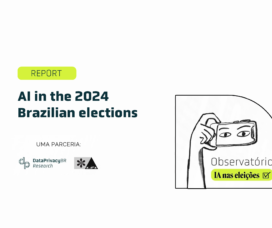
AI in the 2024 Brazilian elections
Aláfia Lab, *desinformante and Data Privacy Brasil launch the report “AI in the 2024 Brazilian elections”, with an analysis of the use of artificial intelligence in the first round of the elections.
-
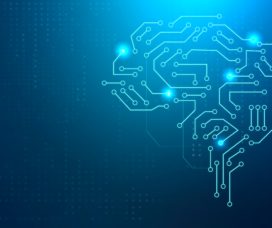
Exploring Opportunities in the Digital Economy and AI at the G20
The task force 5 of T20 Brasil has engaged several international think tanks to provide ideas and policy proposals on crucial areas of technological development, such as AI and Digital Public Infrastructures. This includes encouraging G20 nations to adopt policies that protect individual rights while fostering innovation.
-

DIRECT Learning Series: data protection training and capacity building
The 5th workshop took place on October 2nd, 2024, in the context of the Data Rights and Enforcement through Community Trust (DIRECT) Learning Series, an ongoing thematic series of workshops with members of the DIRECT consortium, supported by Internews.
-
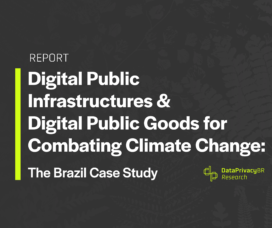
Digital Public Infrastructures & Digital Public Goods for Combating Climate Change: The Brazil Case Study
Data Privacy Brasil, with the support of the Digital Public Goods Alliance (DPGA), launches a new report that aims to analyze the integration between Digital Public Infrastructure (DPI) and Digital Public Goods (DPGs) as tools to combat climate change.
-

A Fragmented Landscape Is No Excuse for Global Companies Serious About Responsible AI
For the third year in a row, MIT Sloan Management Review and Boston Consulting Group (BCG) have brought together an international panel of AI experts to help gain insights into the lack of alignment around global standards and norms for responsible AI. Bruno Bioni, co-director of Data Privacy Brasil, was one of the experts interviewed. Check it out in the text!
-
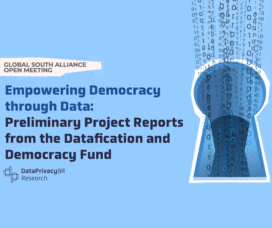
Empowering Democracy through Data: preliminary project reports from the DDF
The Global South Alliance wil host its next open meeting on October 22, 2024, where grantees from the first cohort of the Datafication and Democracy Fund (DDF) will present their impactful research.
-

Research Project Outcomes: A vision for inclusive educational technology
Check out Júlia Mendonça's interview for Tech Ethics Lab, about the use of technology in schools.
-

Protean acknowledged for leadership in digital public infrastructure
A report from Data Privacy Brasil underscores how DPI can be leveraged to create environments where data privacy and security are prioritized.
-

DIRECT Learning Series: strategies for meaningful engagement in the context of implementation of Digital ID systems
This workshop took place on August 28th, 2024, in the context of the Data Rights and Enforcement through Community Trust (DIRECT) Learning Series, an ongoing thematic series of workshops with members of the DIRECT consortium, supported by Internews.
-
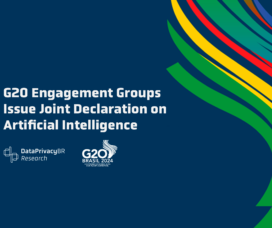
G20 Engagement Groups Issue Joint Declaration on Artificial Intelligence
On Tuesday (10), the main G20 engagement groups, including Civil 20 (C20), Labor 20 (L20), Think 20 (T20) and Women 20 (W20), announced a groundbreaking joint statement on the ethical, sustainable and inclusive development and deployment of artificial intelligence (AI).
-
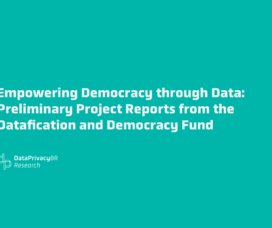
Empowering Democracy through Data: Preliminary Project Reports from the Datafication and Democracy Fund
The Global South Alliance held its first meeting with the organizations covered by the Datafication and Democracy Fund. On the occasion, each of the five organizations - Like a Palm Tree (Africa), Center of Security and Citizenship Studies (LatAm), Corporación Cambio Sostenible (LatAm), Criminal Justice & Policy Accountability Project (India), and Ikigai Innovation Initiative (Africa) - had the opportunity to present the preliminary results of their projects and hear feedbacks from the GSA members.
-
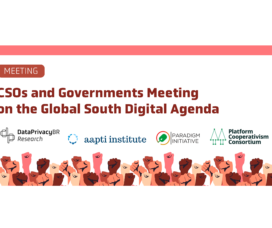
CSOs and Governments Meeting on the Global South Digital Agenda
On September 21st and 24th, the event “Open Dialogue: Global South Alliance and Governments for an Inclusive Digital Agenda” will take place, promoted by the organizations Data Privacy Brasil, Aapti Institute, Paradigm Initiative and PCC (The New School). The event aims to provide an open conversation with diplomats about the international agenda for IPRs, AI, GDC implementation and G20 continuity.
-
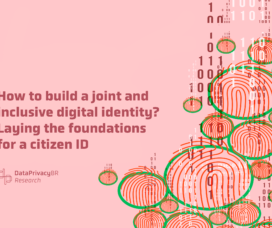
How to build a joint and inclusive digital identity? Laying the foundations for a citizen ID
Do you know what an identity is? Thinking about facilitating access to the topic, Data Privacy Brasil has developed a series of content to provide the foundations and tools possible for all the details on the subject. With this, we will be able to discuss, as a community, what we want with a digital identity and how we can achieve it.
-
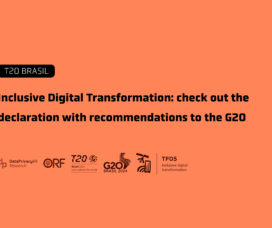
Inclusive Digital Transformation: check out the declaration with recommendations to the G20
In the document, six priorities were defined to deal with issues such as digital inclusion and meaningful universal connectivity; and challenges, opportunities and governance of artificial intelligence.
-
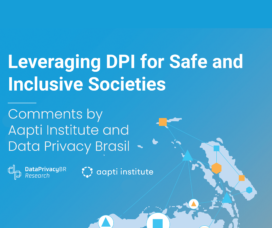
Leveraging DPI for Safe and Inclusive Societies
Aapti and Data Privacy Brasil have submitted their contribution to the Office of the United Nations Secretary-General's Envoy on Technology (OSET) and the United Nations Development Programme (UNDP) regarding the report "Leveraging DPI for Safe and Inclusive Societies".
-
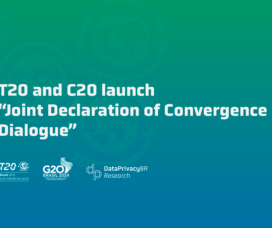
T20 and C20 launch “Joint Declaration of Convergence Dialogue”
On the 2nd and 3rd of July, a Mid-Term Conference took place in Rio de Janeiro, a T20 event with the participation of leaders from national and international think tanks, members of academia, representatives of the private and public sectors and civil society to discuss and propose solutions to the main global challenges.
-

Datafication and Democracy Fund welcomes five organizations from the Global South for short-term projects
The Datafication and Democracy Fund Committee, composed of Data Privacy Brasil, Paradigm Initiative, and Aapti Institute, is pleased to announce the five organizations awarded funding for a short-term research project.
-
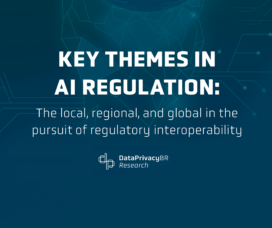
Key Themes in AI Regulation: The local, regional, and global in the pursuit of regulatory interoperability
Data Privacy Brasil releases its report “KeyThemes in AI Regulation: The local, regional, and global in the pursuit of regulatory interoperability,” supported by the Heinrich Böll Foundation. This work is the result of months of research under the project “Where the SabIA Sings: Governance and Regulation of Artificial Intelligence from Brazil”.
-
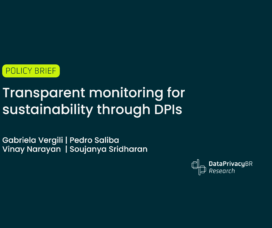
Transparent monitoring for sustainability through DPIs
In this new publication, researchers Gabriela Vergili, Pedro Saliba from Data Privacy Brasil, Vinay Narayan and Soujanya Sridharan from Aapti Institute, discuss the “Transparent monitoring for sustainability through DPIs”.
-
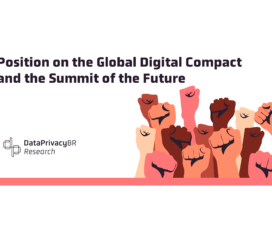
Position on the Global Digital Compact and the Summit of the Future
Between the 9th and 10th of May, the UN Civil Society Conference is happening in Nairobi. The event is presented as an opportunity to engage civil society in preliminary discussions ahead of the Summit of the Future.
-
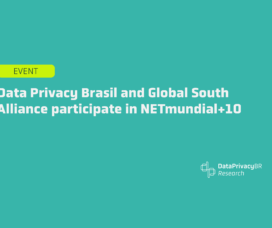
Data Privacy Brasil and Global South Alliance participate in NETmundial+10
Between April 29th and 30th, the NETmundial+10 took place in São Paulo. Building upon the event and the NETmundial Declaration of 2014, this event focused on strengthening global multistakeholder governance for the Internet and digital technologies, as well as conveying messages to global actors for better coordination of various ongoing processes.
-
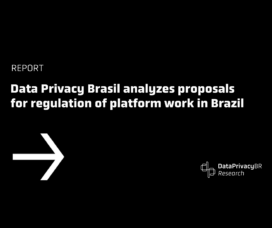
Emerging trends in the regulation of platform work in Brazil: a preliminary report
The new report produced by Data Privacy Brasil provides a brief introduction to the topic, exposing the size and importance of the Brazilian platform market.
-
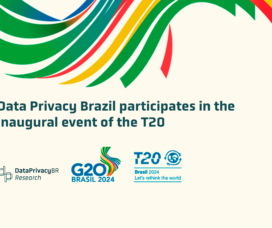
Data Privacy Brazil participates in the inaugural event of the T20
Between March 4th and 6th, the Organizing Committee of T20 Brazil - composed of CEBRI, FUNAG, and IPEA - held the first official event of the engagement group. The event took place entirely virtually and was openly broadcast to the public.
-

Inclusive Digital Transformation in the T20
The year 2024 marks Brazil's presidency in the G20, the group of the world's largest economies, chaired by our country for the first time. It is a year of great opportunity for Brazil to influence a broad global governance agenda, prioritizing issues such as inequality, climate change, and, of course, digital transformations.
-
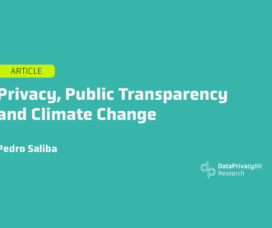
Privacy, Public Transparency and Climate Change
How transparency and data protection can help environmental public policies in Brazil.
-
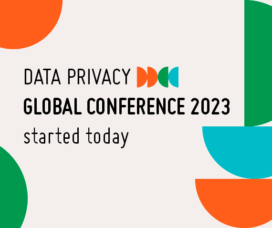
Data Privacy Global Conference 2023 started today
Data Privacy Global Conference, organized by Data Privacy Brasil, started this Monday (November 27th) in São Paulo, at the ESPM School.
-
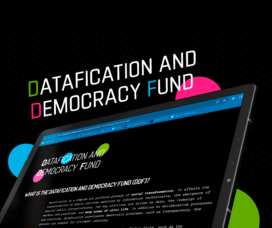
Data Privacy Brasil, Paradigm Initiative and Aapti Institute announce the launch of the “Datafication and Democracy Fund”
The fund aims to finance activities that strengthen the work of NGOs in the Global South on issues of datafication and democracy
-
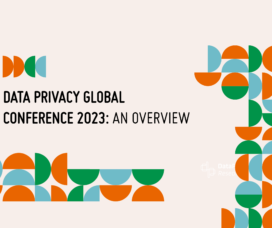
Data Privacy Global Conference 2023: an overview
The second edition of the Data Privacy Global Conference brought together professionals from more than one hundred civil, business and government organizations in a two-day event in the city of São Paulo, between November 27th and 28th, 2023. With more than 20 sponsors, the 2023 DPGC edition was a public success, with more than 250 participants.
-
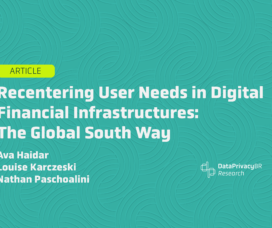
Recentering User Needs in Digital Financial Infrastructures: The Global South Way
Through India’s G20 leadership in 2023, global agendas of digital transformation and financial growth have come to be intimately reoriented to challenges, priorities and special developments in the Global South.
-

At UNCTAD eWeek, Data Privacy Brasil will discuss the intersection between digital economy and human rights in AI regulation
The UNCTAD eWeek, an initiative of the United Nations Conference on Trade and Development (UNCTAD) in partnership with eTrade for all, will occur from the 4th until the 8th of December.
-
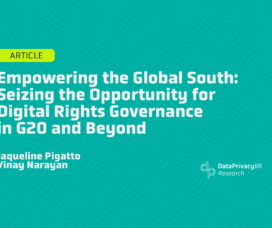
Empowering the Global South: Seizing the Opportunity for Digital Rights Governance in G20 and Beyond
The G20 represents a critical policy space for addressing emergent challenges on a global scale and its importance as a platform is pronounced when we consider its significance for the Global South.
-
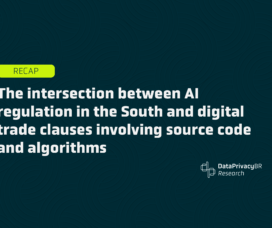
The intersection between AI regulation in the South and digital trade clauses involving source code and algorithms
Recap of Session 43 of the WTO’s 2023 Public Forum organized by Data Privacy Brasil and REBRIP
-
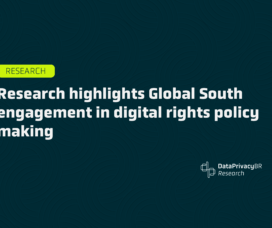
Research highlights Global South engagement in digital rights policy making
The Data Privacy Brasil Research Association announces the launch of the research report on Global South perspectives on international engagement in digital rights.
-

Data Privacy Brazil participates in the 18th edition of the Internet Governance Forum in Japan
Data Privacy Brasil will aim to monitor and contribute to topics such as governance, regulation, accountability, and digital civil identity, giving visibility to the Brazilian scenario and the Global South.
-
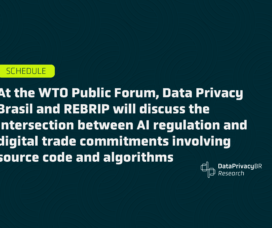
At the WTO Public Forum, Data Privacy Brasil and REBRIP will discuss the intersection between AI regulation and digital trade commitments involving source code and algorithms.
The WTO Public Forum 2023 will take place between September 12th and 15th in Geneva.
-
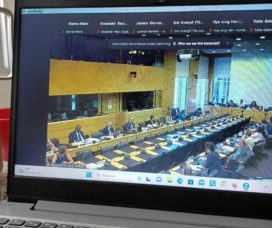
Data Privacy Brasil participates in UN’s OHCHR briefing on Brazil
The organization highlighted how the advance of edtech has been violating children’s privacy in the country
-

Data Privacy Brasil’s contribution to the Thematic Deep Dive of Artificial Intelligence and other Emerging Technologies of the Global Digital Compact
As other civil society organizations already pointed out, notable preference was given to the speech of Member States, UN agencies, and the private sector, at the expense of human rights civil society organizations, which prevented the speech that had been prepared by the DBPR and other civil society stakeholders.
-

Data Privacy Brasil contributes to the Thematic Deep Dive in Data Protection (Global Digital Compact)
Data Privacy Brasil participated in the Thematic Deep Dive Session in Data Protection, organized by the co-facilitators ambassadors of the Global Digital Compact.
-
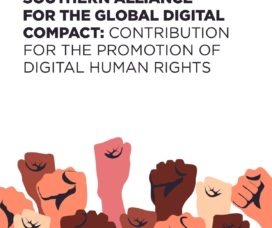
Southern Alliance for the Global Digital Compact
Responding to the call made by the United Nations, the Data Privacy Brazil Research Association, together with organizations from the Global South, presents a contribution to the Global Digital Compact.
-
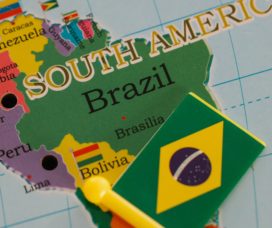
Data Privacy Brasil Research Association contributes to UN open call on the relationship between human rights and technical standard-setting processes
We received a call as an opportunity to submit suggestions to inform the OHCHR report on the relationship between human rights and standard-setting processes for new and emerging digital technologies.
-
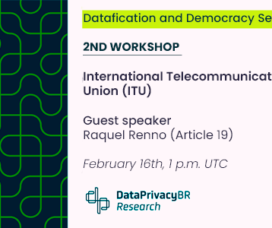
Our second workshop of a series about technical forum talks about the International Telecommunications Union
In the second meeting of the Datafication and Democracy Workshop Series, we received Raquel Renno, Digital Programme Officer of Article 19, who spoke about the International Telecommunication Union (ITU) for third sector organizations.
-
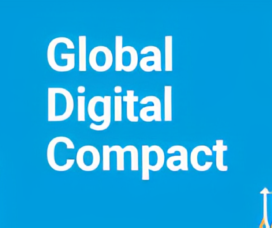
Let’s stay tuned for the Global Digital Compact
What is the Global Digital Compact and why is it important to keep an eye on it?
-

Why should we all pay attention to the Brazilian Digital ID system?
The implementation of digital identity systems is increasing around the world, especially in Global Southern countries. The model widely adopted is known as Big ID, promoted by or linked to public administration bodies which use centralized biometric databases to identify and authenticate citizens (Access Now, 2021).
DataPrivacyBr Research | Content under licensing CC BY-SA 4.0

